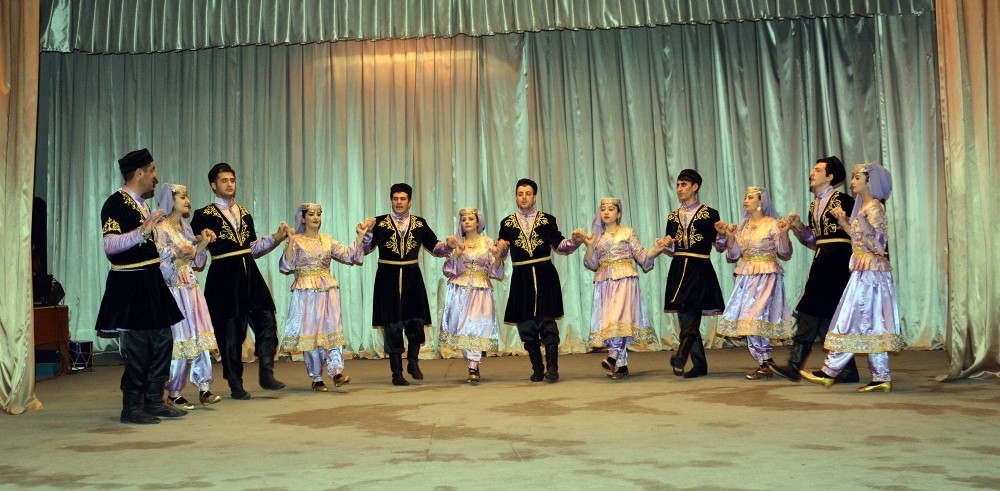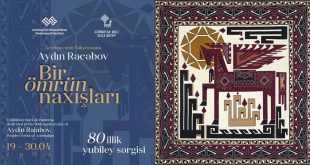
Yalli – a masterpiece of Azerbaijani folk dance is not just an ordinary dance, it shows the characteristics of the Azerbaijani nation, symbolizing its braveness, unity and solidarity.
Yalli, traditional group dances, is considered the pearl and the oldest type of Azerbaijani culture.
These dances are the expression of the past, the present and national traditions of the Azerbaijani people. It requires a great effort to preserve this folklore heritage called a symbol of antiquity, which is transmitted from generation to generation throughout the centuries to the present days.
One can hardly imagine any important celebration held in the country without these graceful movements, performed for hundreds of years at folk festivals and games, weddings and entertaining mock battles.
The history of dancing art of Azerbaijan traces its roots from Stone Age. A clear of evidence of this fact is petroglyphs resembling the Azerbaijani yalli round dance, which meet visitors at the entrance of the Gobustan State Historical-Artistic reserve – a UNESCO World Heritage Site. The heritage site abounds with images of dancing people among the numerous petroglyphs. Some of these images feature dancing people holding their hands as if performing yalli. These millennia-old images once again confirm the fact that the yalli dance emerged in this land a very long time ago.
Experts estimated that more than thousand varieties of yalli in Azerbaijan, including “Kochari”, “Uchayag,” “Tello,” “Tenzere” and “Galadangalaya”. Remarkably, a hundred of these dances are cherished in Nakhchivan, an ancient land of Azerbaijan.
Common feature for all types is that it is performed as a cheerful circular dance often accompanied with a choral singing. Dancers hold hands or shoulders of each other, and make rhythmic synchronous movements, raising and lowering their arm, while the rhythm and pace of the steps are determined by the lead dancer.
Typically, yalli dances involve elements of games, pantomime (bird or other animal imitations), physical exercises and movements.
The joyful sounds of yalli can also be heard in Azerbaijani villages during holidays, in particular, Novruz, which is one of the most important ad favorite holidays of the solemnly celebrated by the Azerbaijanis both in the country and abroad.
Yalli tunes – widely known and popular in the country, were also used by prominent Azerbaijani composer Uzeyir Hajibayli in the Korogly” opera, legendary opera and music performer Muslim Magomayev in the “Nargiz” opera, as well as famous composer and conductor Soltan Hajibayov in the “Gulshan” ballet.
One of the best showcases of the Azerbaijani yalli dance was during the opening ceremony of the First European Games as President Ilham Aliyev declared the Games open following a spectacular celebration held in the capital city of Baku in June 2015.
As the firework display built in intensity, all of the performers gathered around the edge of the circular stage. They held hands and dance Yalli – the national dance of Azerbaijan. During the Yalli, the names of all the Ceremony volunteer performers appeared on the LED strip that run around a stadium balcony, scrolling along its entire length. Twenty thousand inflatable ‘pomegranate seeds’ cascaded over the audience. They were a token of love and good luck and a symbol of Azerbaijan. This joyous Yalli dance brought the Opening Ceremony to a celebratory end.
Yalli (Kochari, Tenzere) traditional group dances of Nakhchivan were included in the UNESCO list of Intangible Cultural Heritage in Need of Urgent Safeguarding at the 13th session of the UNESCO Intergovernmental Committee for the Safeguarding of the Intangible Cultural Heritage held in Port Louis, the Republic of Mauritius in 2018. The nomination documents was submitted jointly by Azerbaijan’s Ministry of Culture, Ministry of Foreign Affairs and the Permanent Mission of Azerbaijan to UNESCO.
 Oval Useful news from Azerbaijan and Caucasus
Oval Useful news from Azerbaijan and Caucasus


